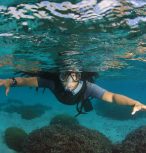DNA reveals the past and future of coral reefs
New DNA techniques are being used to understand how coral reacted to the end of the last ice age in order to better predict how they will cope with current changes to the climate. James Cook Univer

From 2005 to 2022, the main node of the ARC Centre of Excellence for Coral Reef Studies was headquartered at James Cook University in Townsville, Queensland (Australia)








Abstract: Outbreaks of the crown-of-thorns starfish, Acanthaster planci, represent one of the most significant biological disturbances on coral reefs and remain one of the principal causes of widespread decline in live coral cover in Indo-Pacific reefs. In the Great Barrier Reef (GBR), for example, predation by A. planci accounted for 42% of substantial declines in coral cover in the past 27 years. Increasing frequency and intensity of outbreak episodes have resulted in progressively slower recovery, which consequently degrades the integrity of reef ecosystems. Despite previous and ongoing efforts to control A. planci populations, outbreaks continue to occur throughout the Indo-Pacific and at many locations. In some of these locations, the effects of severe outbreaks have been far greater than combined effects of all other major disturbances, including climate-induced coral bleaching. Longterm or permanent solutions depend on filling crucial gaps in our knowledge of the biology of A. planci, particularly reproduction and early life history. The main objective of my research is to explore variations in tolerances and vulnerabilities of the early life history stages of A. planci to variable environmental conditions. I will specifically investigate the effect of different food availability, salinity, temperature, and pH conditions to establish key limitations in reproductive potential, fertilization success, larval development, and postsettlement growth. There is widespread recognition that these aspects of the biology of A. planci are fundamental in understanding the proximal causes of outbreaks.
Biography: Ciemon completed his BSc in Biology at Silliman University in the Philippines. He proceeded to work with the Coastal Conservation and Education Foundation after his undergraduate studies and was involved in several coral reef management projects throughout the Philippines. He decided to pursue his MSc in Biology degree at the University of Guam in 2006, where he studied the role of chemical cues on the feeding ecology and distribution of crown-of-thorns starfish (COTS) populations around Guam. After finishing his MSc, he continued to study and monitor chronic COTS outbreaks on Guam’s reefs and collaborated with JCU on developing novel techniques to control COTS populations. He is currently doing his PhD under the supervision of Prof. Morgan Pratchett, Dr. Jairo Rivera-Posada, and Dr. Alexander Kerr. His research explores environmental influences on the reproductive, larval, and postsettlement biology of COTS.
New DNA techniques are being used to understand how coral reacted to the end of the last ice age in order to better predict how they will cope with current changes to the climate. James Cook Univer
A new study on the effects of climate change in five tropical countries has found fisheries are in more trouble than agriculture, and poor people are in the most danger. Distinguished Profess
James Cook University researchers have found brightly coloured fish are becoming increasingly rare as coral declines, with the phenomenon likely to get worse in the future. Christopher Hemingson, a
Researchers working with stakeholders in the Great Barrier Reef region have come up with ideas on how groups responsible for looking after the reef can operate more effectively when the next bleaching
Abstract: As marine species adapt to climate change, their heat tolerance will likely be under strong selection. Individual variation in heat tolerance and its heritability underpin the potential fo
Abstract: The Reef Ecology Lab in KAUST’s Red Sea Research Center explores many aspects of movement ecology of marine organisms, ranging from adult migrations to intergenerational larval dispersal
Abstract: Macroalgal meadows are a prominent, yet often maligned component of the tropical seascape. Our work at Ningaloo reef in WA demonstrate that canopy forming macroalgae provide habitat for ad
Abstract: Sharks are generally perceived as strong and fearsome animals. With fossils dating back at least 420 million years, sharks are not only majestic top predators but they also outlived dinosa
Abstract: Connectivity plays a vital role in many ecosystems through its effects on fundamental ecological and evolutionary processes. Its consequences for populations and metapopulations have been
Abstract: Evolution of many eukaryotic organisms is affected by interactions with microbes. Microbial symbioses can ultimately reflect host’s diet, habitat range, and even body shape. However, how
Abstract: The past few years have seen unprecedented coral bleaching and mortality on the Great Barrier Reef (GBR) but the consequences of this on biodiversity are not yet known. This talk will expl